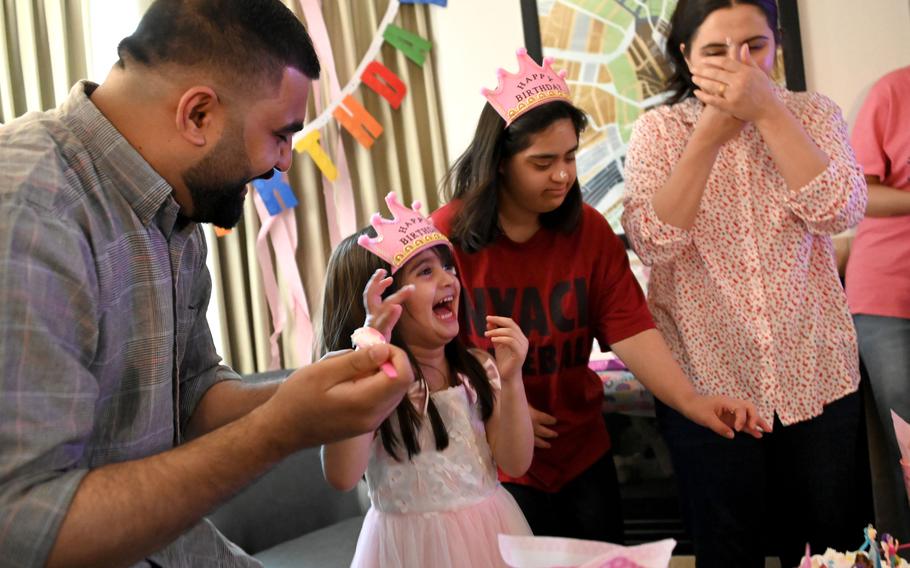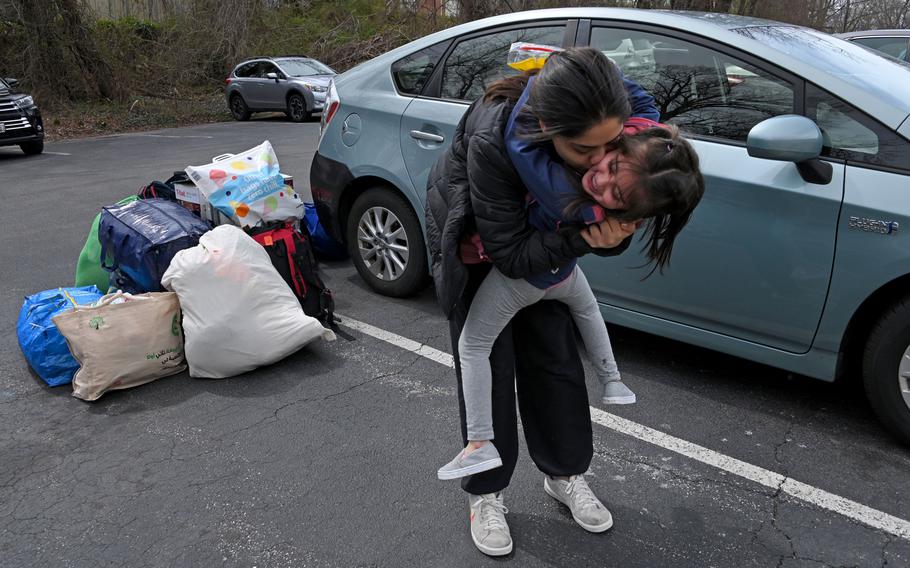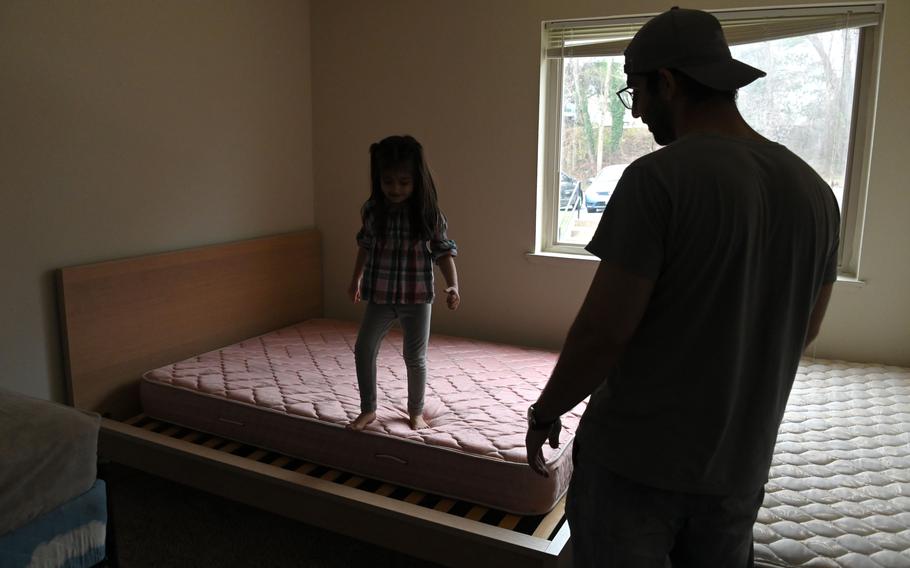
Wali Zadran , left, an Afghan refugee, at a birthday party for his daughter, Hareer, who is turning 4. Wali and his wife Khadija, right, have always had elaborate birthday parties for their only child and wanted to continue that tradition even though they were living in a hotel at the time. Wali’s younger sister, Zala, also enjoys the party. (Lloyd Fox, Baltimore Sun/TNS)
(Tribune News Service) — As his daughter’s fourth birthday approached, Wali Zadran thought of the parties he and his wife had previously hosted, one at a five-star hotel in Kabul even, with elaborate cakes and decorations in colors matching the girl’s fluffy party dress.
“It’s for the memories,” Zadran said.
But for this birthday, a similar party seemed unlikely. He, his wife Khadija and daughter Hareer were living in a small hotel room near BWI Marshall Airport with two beds, a kitchenette and what few possessions they still have after a rushed evacuation from Afghanistan following the U.S. withdrawal in August.
What Hareer will remember from these nomadic seven months remains to be seen, though she sometimes asks, as if they’re on a particularly long vacation, when they’re going home.
It is less a question of when than if.
The family, including Zadran’s mother, brother and two sisters, is among more than 76,000 refugees accepted into the United States since the end of the nearly 20-year war in Afghanistan and the takeover by the fundamentalist Taliban.
“Things happened so quickly,” Zadran, 32, said, “we didn’t have time to think.”
They only knew they had to leave, he said, with the Taliban seeking retribution against those who had worked with the U.S.-backed Afghan government, international agencies and coalition military force, and sure to reverse advances such as on women’s rights.
A lawyer by training, Zadran was an oil and gas official for the Afghan government. His sister, Shkula, 27, served as a youth representative to the United Nations. His brother, Atal, 25, worked for the Ministry of Education. And his mother, Sahera Sharif, 61, is a former member of Parliament and founder of a women’s literary society in Afghanistan that gave voice to an otherwise silenced population.
They have been on the move since, first to a safe house in northern Afghanistan, then U.S. military bases in Qatar and New Jersey, and, in mid-January, Maryland — Zadran and his wife and daughter to the hotel near BWI and his mother and siblings to one in Silver Spring.
What was meant to be temporary housing extended into months for some, as an unprecedented influx of refugees arrived amid a surging coronavirus pandemic, and the resulting staffing and housing shortages.
The International Rescue Committee, the agency charged with resettling refugees in Baltimore, scrambled to add staff to help the 480 Afghan nationals who arrived between October and February. Delays in finding apartments and permanent addresses for refugees led to other delays, from getting driver’s licenses to placing children in school.
The pace has improved since those first harried months, officials said, but the work remains as the refugees make tentative steps forward into their new communities.
Despite their experiences in a war-torn country, Baltimore has proved frightening for some, such as one young woman and her sister. The woman, who asked that her name be withheld to protect family in Afghanistan, said they were moved one evening from the hotel to an apartment near Druid Hill Park with just a blurry map to find a grocery store about a mile away. As night fell, they managed to find the store on foot but got lost for about an hour before making their way back.
“One day, there was a guy in a car; he threw the trash at us. I don’t know what he said, but I got it was a curse word,” the woman said. “Another day, a drunk guy was following us and asking us for money.”
Even as they look forward, there is longing and fear for family left behind. One refugee who had worked as an interpreter for U.S. forces said his son told him the Taliban came to the house looking for him.
They try to help one another, the English-speakers interpreting for those who speak little or none, communicating with families in Afghanistan via WhatsApp groups.
For the Zadran family, the holding pattern of several months recently started to break, with several opportunities to resume interrupted careers.
“Things are happening,” he said, “and I’m so happy.”

Shkula Zadran kisses her niece, Hareer Zadran, 4, as they get ready to move into an apartment in Howard County after staying in a hotel for months after fleeing Afghanistan. (Lloyd Fox, Baltimore Sun/TNS)
‘A horror movie’
Just seven months later, the fall of Afghanistan seems far more distant, particularly after Russia invaded Ukraine, creating an even newer global refugee crisis.
But to those who lived it, those final days remain vivid, with the Taliban rapidly taking one provincial capital after another until taking Kabul on Aug. 15. Afghan President Ashraf Ghani fled the country, and thousands descended on the airport in desperate attempts to evacuate.
“It looked like a horror movie, a zombie movie,” said Abdul, 25, a former police officer who asked that his last name not be used to protect family in Afghanistan. “Every road, people are running everywhere, how can they find a way to save themselves.”
Having trained with a U.S. military unit, he went into hiding as the Taliban took power. He was able to contact an American officer he calls his adviser, who had since returned to the U.S.
The officer told Abdul he would try to get him out of the country, and he should head to Kabul as quickly as possible and await a call from someone there. It took several days to get to the capital, hear from the contact and gain entry to the airport, Abdul said.
From there, he was flown to Bahrain then Germany, until on Sept. 8, he landed at Washington Dulles International Airport in northern Virginia, where they were met with food, showers, paperwork and warmth.
“When the doors opened, there were two lines of people: ‘Welcome to the U.S. … Welcome to your home,’” Abdul said. “I will never forget this.”
Soon, he was able to contact his adviser who, as it turns out, was just 15 minutes away. They were reunited, hugging one another tightly. “He was like my big brother,” Abdul said.
Although they’ve visited often since his arrival, Abdul said he doesn’t want to be a burden and is trying to strike out on his own. He was placed in an apartment with a roommate in Reservoir Hill.
“I know all the city now,” he said, having made use of his monthly MTA CharmCard pass.
On one bus, he saw an ad, “Work today, get paid tomorrow, we’re hiring,” and took a cell phone picture. It was for Royal Farms. He applied and recently began working at one of the outlets.
He has grown fond of the Maryland Transit Administration bus drivers and said they have been unfailingly helpful.
“It’s much better than the current situation in Afghanistan,” Abdul said. “I know the bad days are not going on forever. If we want to have a good future, it takes time.
“We do our best to find our way.”
Help on the ground
Some of the refugees initially thought the women were caseworkers from the resettlement agency when they began showing up at the hotels near BWI.
They turned out to be a group of volunteers, the kind of women who run clothing and food drives and help at homeless shelters and other community programs. They had heard through their networks and from groups, including the Council on American-Islamic Relations, that some refugees were having trouble getting health care and other services.
“They’ve gone through a traumatic experience. Often, they’ve had to leave family behind,” said Janice Keating, who lives in Severna Park and is active in volunteer groups in Anne Arundel County. “This is just more trauma.”
They got busy, finding out what the refugees needed: tea kettles, pressure cookers or laptops, as well as help writing resumes, finding jobs or locating delayed documents or benefits.
The IRC resettlement agency said it’s been overwhelmed by an unprecedented number of refugees arriving in a compressed span of time. Coinciding with the omicron surge in the coronavirus pandemic and an affordable housing shortage, the IRC said, the resettlement process has gone more slowly than it should.
Ruben Chandrasekar, the IRC’s director in Baltimore, said the same staffing shortages and slow deliveries others faced during the pandemic strained the agency’s ability to help a “historic” number of refugees from the more than 120,000 people evacuated from Afghanistan during the final, chaotic days before the U.S. withdrawal.
“It was extremely challenging,” he said. “In an emergency, you can’t provide the same level of services.”

Atal Zadran watches his niece, Hareer, as she checks out the beds in Atal’s new apartment. The Afghan family moved into a Howard County apartment after fleeing their country and the Taliban. (Lloyd Fox, Baltimore Sun/TNS)
In the past, Chandrasekar said, the IRC would receive several weeks’ notice that a family was on its way, allowing the agency to secure and furnish an apartment before its arrival. Now, though, the IRC sometimes gets only a day or two’s notice that dozens of migrants have left the military bases where they’ve been staying and are en route to Baltimore, he said.
At the BWI-area hotels, the refugees are largely isolated. There’s not much to walk to, except a convenience store at a gas station. Some of the men gather in a conference room for Friday prayers. Kids play in the parking lot, running around and tossing balls, and some have started school.
On a recent day, as volunteers spread out donations of food, clothing and books in the parking lot, one boy returned from school, smiling as he talked about making a new friend to sit with at lunch. Keating had brought a couple of party dresses for Zadran’s daughter in anticipation of her birthday.
The volunteers have, at times, taken refugees into their homes temporarily.
Jeanette Middleton-Sudano is the executive director of an Anne Arundel organization that helps homeless people and a Gold Star mother. She lost her son, Airman 1st Class Nathaniel H. McDavitt, 22, in a 2016 building collapse in Jordan. She learned of the refugees through Keating and tapped into her church and community network to help “as lifelines” for the newcomers.
“I’m a woman of great faith,” Middleton-Sudano said. “God has dropped these people in our lap.
“I want them to be successful here. I want them to go, ‘Americans are great.’”
A refugee, again
On March 10, the Zadrans celebrated Hareer’s birthday. The hotel suite of her grandmother, uncle and two aunts was decorated in pink and white ribbons and balloons. Keating had brought presents from the volunteers and a cake from Costco with candles and princess figurines.
In a pink dress and foam crown, Hareer blew out the candles and danced to the universal children’s anthem, “Baby Shark,” complete with the jaw-snapping hand claps.
From the small kitchen, a bounty of food emerged — curries, spinach, salads and a big platter of kabuli, the national dish made with rice, carrots and raisins.
Wali Zadran looked pleased to once again serve as host.
If he wanted to provide a memory for his daughter, perhaps it was because he remembered being in the same situation, albeit as a 7-year-old.
It was 1996, and the Taliban had taken control of Kabul after emerging from a civil war that followed the Soviet Union’s occupation of Afghanistan, declaring the country an Islamic emirate.
With family members targeted by the new rulers, the Zadrans fled to Peshawar, Pakistan. In October 2001, the U.S. bombed Afghanistan, which had harbored the mastermind of the 9/11 terrorist attacks, al-Qaida leader Osama bin Laden, and, by the end of the year, had toppled the Taliban regime.
The Zadrans returned home and rebuilt their lives. Wali Zadran became a lawyer and joined the government, rising to deputy minister of mines and petroleum, then general director of the country’s oil and gas regulatory agency. His sister traveled the country as a youth representative for the U.N. His brother worked in information technology. Their parents — his father, an academic, remains in Afghanistan — had a second daughter, Zala, now 18 years old.
Then the Taliban returned to power last year, and they again became refugees.
“I never imagined it would happen a second time,” he said.
The family recently found and moved into apartments in a complex in Howard County, chosen for the good school system.
Atal Zadran has begun a new job as a software engineer, while Shkula Zadran hopes to continue working on a master’s degree in international relations and on youth and women’s rights advocacy in her homeland.
“I belong to Afghanistan,” she said. “You can’t cut off your roots.”
And recently, Wali Zadran received big news: He was accepted into the master of laws program at Columbia Law School and awarded a full scholarship designed for displaced persons.
The scholarship includes housing and other expenses, so he plans to live in New York but commute to Maryland to see his family.
“I was overjoyed and excited and a little bit emotional,” he said.
“With the pain and the pressure of losing everything,” Zadran said, “it somehow released the burden in my heart.”
©2022 Baltimore Sun.
Visit baltimoresun.com.
Distributed by Tribune Content Agency, LLC.